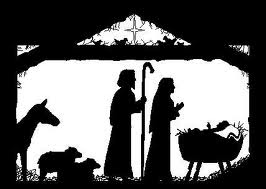During Advent, Christians gather around the Manger, as yet empty. “Come, Lord Jesus, do not delay,” the Church’s liturgy prays.
Just as the Baby in the Manger represents for us the greatest Gift God brings, so the emptiness of the Manger represents the deep needs of the human heart — needs that not only we experience individually, but that the human family has experienced from the beginning of time.
Adam and Eve alienated themselves and their descendants from intimacy with God. They lost paradise, and ever since, humanity has longed to regain it. The Manger has been empty.
 As much as we need food, we need meaning just as much. We want to know who God is and what life is about. The human mind can only go so far in figuring it out; we need the God who speaks, and he spoke in full measure only when Christ came. Until then, the Manger was empty.
As much as we need food, we need meaning just as much. We want to know who God is and what life is about. The human mind can only go so far in figuring it out; we need the God who speaks, and he spoke in full measure only when Christ came. Until then, the Manger was empty.
And humanity needed to be reconciled to God. Isaac asked his father Abraham, as they walked to the place of sacrifice, “The fire and wood are here, but where is the lamb for the burnt offering?” (Gen. 22:7). Indeed, where is the lamb? What sacrifice can suffice for our sins? How can we overcome the enmity that separates us from God? Who will be the bridge back to paradise? The Manger was still empty.
Humanity, moreover, awaited the fulfillment of the great promise that death itself would be conquered. Humanity awaited one who could free all people from the fear that death would be the end of the human story. “He will destroy the veil that veils all peoples, the web that is woven over all nations; he will destroy death forever” (Isaiah 25:7-8). This has been the hope of the human heart from the beginning. But the Manger was still empty.
Empty, that is, until the Holy Night in Bethlehem. Hence we sing, “The hopes and fears of all the years are met in Thee tonight” (from the hymn “O Little Town of Bethlehem).
His birth is all about hope fulfilled and hope inspired. He is the one who answers all our questions, fulfills all our hopes, and calms all our fears.
CLICK LIKE IF YOU’RE PRO-LIFE!
In him we welcome the Culture of Life. It has been said that the false god transforms suffering into violence, but the true God transforms violence into suffering. In the newborn Christ, we find the God in whom we can resist the temptation to solve an unexpected pregnancy by the violence of abortion, or a terminal illness by the violence of euthanasia.
Instead, we can treasure every life, including our own, and transform suffering into loving service.
As we place the statue of the Baby Jesus into the Manger scene on Christmas morning, let us embrace the hope he brings, and work to fulfill the vision of peace, life, and love that Christmas inspires.







